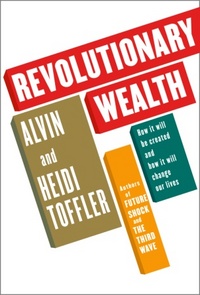 Source of book image: http://www.randomhouse.com/catalog/display.pperl?isbn=9780307265555
Source of book image: http://www.randomhouse.com/catalog/display.pperl?isbn=9780307265555
The titular wealth they speak of comes from substituting "ever-more-refined knowledge for the traditional factors of industrial production — land, labor and capital." The United States is producing more stuff than ever with fewer workers. The Tofflers write that only 20 percent of the work force is now in the manufacturing sector, while some 56 percent (and growing) is engaged in what they call "knowledge work" — managerial, financial, sales-related, clerical and professional tasks. Even activities like agriculture have gone high-tech, through biotechnology and increasingly sophisticated use of global-positioning satellites to customize irrigation and fertilization down to the individual acre. Knowledge-based wealth, they argue, is revolutionary not just because it gets more output from fewer inputs. Unlike such physical resources as oil, knowledge can be shared by an infinite number of people, and its value and benefits are generally increased by wider circulation. (A network, after all, is only as powerful as the number of participants.) Just as important, the Third Wave wealth system "demassifies production, markets and society," creating space for unending experimentation, innovation and individuation.
. . .
Despite visionary passages about nanotechnology (the manipulation of objects at the atomic level) and potential moon-based helium energy, "Revolutionary Wealth" is less interesting for its specifics (most of which will be familiar to readers of publications like Wired, The Economist and Red Herring) than for its evidence of how far we’ve come since the 70’s, when politics, economics and culture all seemed as played out as Richard Nixon’s denials of criminality. In "Future Shock," the Tofflers warned that many people "will find it increasingly painful to keep up with the incessant demand for change that characterizes our time. For them, the future will have arrived too soon." These days, from Baghdad to Bangalore to Boston, it seems more likely that people worry that the future will arrive too late. That’s no small change, and it’s one on which the Tofflers have been shining a light for years.
For the full review, see:
The full reference to the Toffler book is:
Toffler, Alvin, and Heidi Toffler. Revolutionary Wealth. Alfred A. Knopf, 2006.
